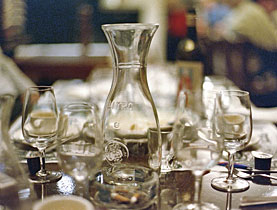
Free water debate fizzes in restaurants

A free carafe or glass of water may one day be a thing of the past in Swiss restaurants.
Both in and outside Switzerland water is now regarded as an important source of revenue for restaurateurs.
Everyone’s had the experience: ask for water in a restaurant and you will almost always be asked to decide between “sparkling or still”.
Although this appears a straightforward question, it is also clear that what will be served will come in a bottle and will not be free.
It is still possible – if you don’t mind being regarded as a skinflint by fellow guests or the waiter – to ask for tap water. But whether it comes free of charge is uncertain.
More and more restaurants are charging for tap water in different ways. Some don’t charge the customer if another beverage is consumed; some put it on the bill according to a flat rate, and others charge between SFr2.50 ($2.27) and SFr6 for a carafe and SFr2 for a glass.
“Urban myth”
Many people think that establishments are obliged, by law, to provide a free glass of water if requested. This, say the authorities in the western canton of Fribourg, is an “urban myth”.
Fribourg legislation contains nothing on the subject – like all other cantons with the exception of Ticino, where the restaurateur “must provide water free of charge when serving a main meal”.
That said, the restaurant isn’t exactly free to do what it wants because a federal law makes it obligatory to put up a sign up that is “clearly on show and easily readable” about service prices. This is seldom the case for tap water.
Anticipating possible disputes with disgruntled customers, the Swiss associations representing cafés and restaurants at both cantonal and national levels strongly recommend their members to be disciplined and stick to the law.
In fact, the associations are rather embarrassed. They are well aware that the recent bottled still water boom has helped many cafés and restaurants stay in business.
A return to serving tap water could be bad news.
Welcome gesture
The associations also emphasise that serving tap water creates costs for the restaurateur – the purchase of carafes, extra washing up and more work for staff. They also note that in some countries, notably Italy, there is a fixed charge for place settings.
“In the long run, a restaurateur cannot really offer services free of charge or lower than what they really cost,” said Brigitte Meier from GastroSuisse, which is the main umbrella organisation representing the branch.
But the associations also know that the catering industry is a way of life and as in any profession, tradition, ethics and image play a significant role.
The time when a carafe of water was spontaneously brought to the table as a welcome gesture is perhaps disappearing. But in the long term, will it really save the profession by charging for a simple glass of water?
Quite a few associations are therefore recommending their members be flexible and think in terms of public relations.
Global debate
One thing is certain: the “free water” debate is taking place around the world. The practice of making people pay for tap water has been developing, with nuances, in many places – and people are sitting up and reacting.
Fashionable restaurants and the mayors of several big cities – including San Francisco, New York, London and Venice – have launched a campaign to encourage consumers, and in particular customers of cafés and restaurants, to return to tap water.
The debate is inseparable from the mounting global criticism about the massive increase in consumption of bottled water.
In Switzerland Jacques Neyrinck, a politician from the centre-right Christian Democratic Party, has presented a parliamentary initiative demanding a ban on water sold in plastic bottles and encouraging the drinking of tap water.
swissinfo, based on an article in French by Michel Walter
Global sales of bottled water – still or sparkling – have increased from 80.59 billion litres in 1997 to 188.77 billion in 2007.
They could even triple by 2012, according to Global Industry Analysts, one of the largest world organisations dealing in industrial forecasts.
The increase has been particularly impressive over the past five years in Asia with an average annual rise of 17.5%. Also in Mexico (+8.6%) and the United States (+8.8%).
The increase mainly involves simple filtered drinking water and is a goldmine for Coca-Cola and Swiss food giant Nestlé, easily the market leader. Its Nestlé Waters division with 72 brands, including Perrier, San Pellegrino, Vittel and Contrex, has about 100 factories in 38 countries employing 35,000 people. Its sales in 2007 were SFr10.4 billion.
Some organisations are campaigning for consumers to give preference to tap water. One such group is London on Tap, which is supported by the mayor of the city, Boris Johnson and Thames Water, which provides local water supplies.

In compliance with the JTI standards
More: SWI swissinfo.ch certified by the Journalism Trust Initiative





























You can find an overview of ongoing debates with our journalists here . Please join us!
If you want to start a conversation about a topic raised in this article or want to report factual errors, email us at english@swissinfo.ch.